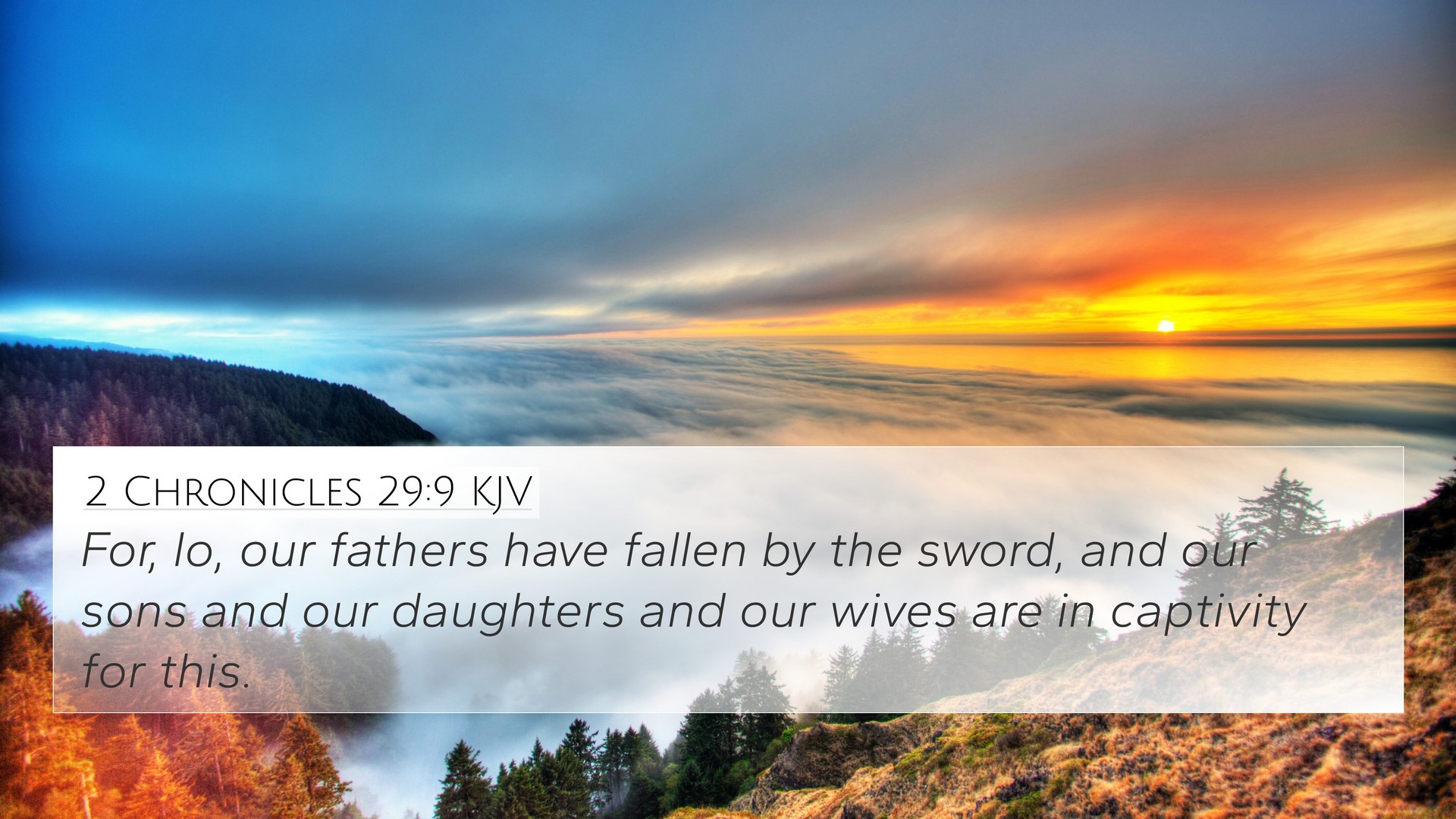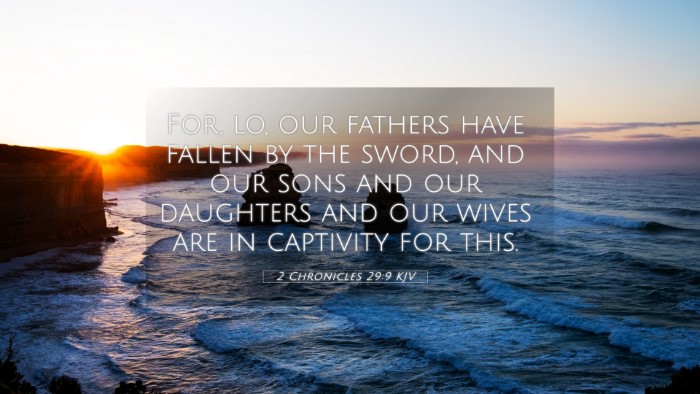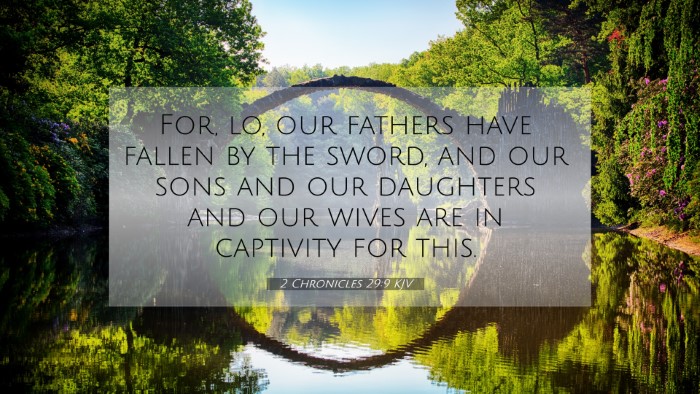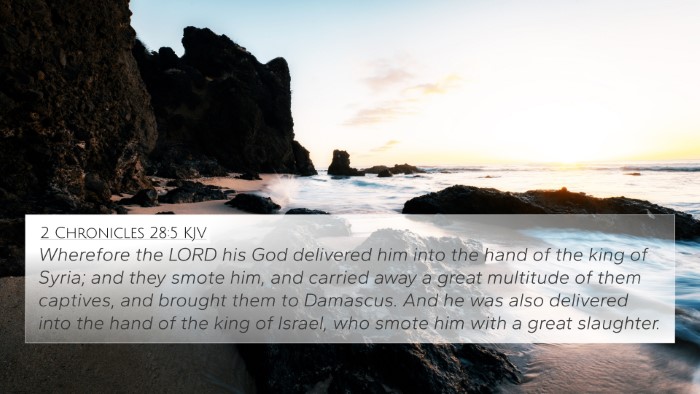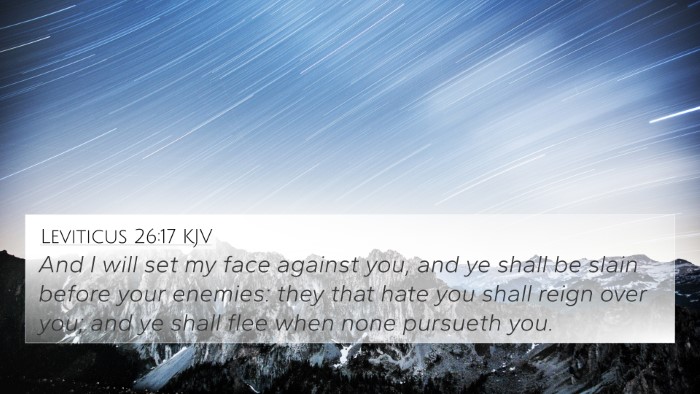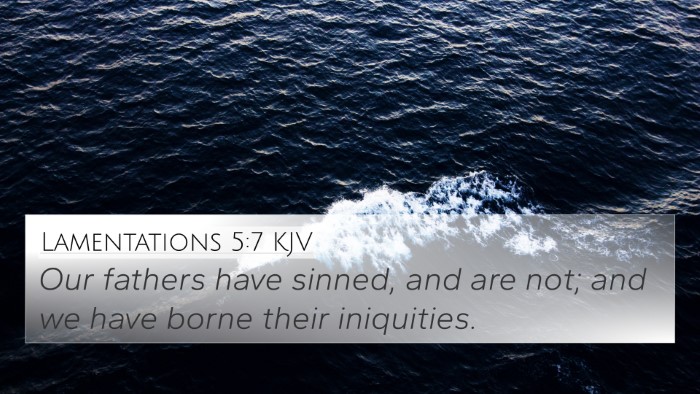Understanding 2 Chronicles 29:9
2 Chronicles 29:9 states, "For, lo, our fathers have fallen by the sword, and our sons and our daughters and our wives are in captivity for this."
This verse captures the lament of a nation in distress, reflecting on the consequences of their ancestors' actions and the impact on future generations. It serves as a reminder of the moral weight of our choices and their far-reaching effects.
Summary of Biblical Meaning
Drawing insights from various public domain commentaries, the following themes emerge concerning 2 Chronicles 29:9:
-
Historical Context: The context here is set during the reign of King Hezekiah, who sought to revitalize the worship of God after a long period of idolatry and neglect. The acknowledgment of suffering directly connects to the nation's disobedience and the subsequent consequences.
-
Moral Accountability: This lament emphasizes personal and collective responsibility. Matthew Henry notes that the sins of the fathers often lead to a legacy of hardship for their descendants, a theme echoed in other scriptures (Exodus 20:5).
-
Intercessory Prayer: This verse serves as a precursor to the prayers for restoration and deliverance that Hezekiah would offer. The realization of their situation is the first step towards repentance and seeking God's intervention (James 5:16).
-
Divine Compassion: Despite the sorrow conveyed, there’s an underlying hope; as seen in Albert Barnes’ commentary, there’s recognition that God is merciful even in judgment, indicating that repentance could lead to restoration.
-
Importance of Corporate Memory: Adam Clarke highlights how the recollection of past generations’ failures serves as a warning for present behavior, urging the people not to repeat their history.
-
Family and Community Relationships: The mention of families—sons, daughters, and wives—signifies the interconnectedness of the community and how collective sin impacts the family unit, reinforcing the need for unity and righteousness (Psalm 78:5-7).
-
Hope for Redemption: Within the sorrow, there exists the possibility for new beginnings. The call to turn back to God and restore the temple worship signifies an opportunity for healing and change within the community.
Cross-References Associated with 2 Chronicles 29:9
- Exodus 20:5 - Discussing the consequences of sin across generations.
- James 5:16 - The power of prayer and confession among believers.
- Psalm 78:5-7 - The importance of teaching future generations about God.
- Isaiah 59:2 - Sin causing separation from God.
- Deuteronomy 30:19-20 - The call to choose life and obedience.
- Jeremiah 31:29-30 - The shift from individual to corporate responsibility for sin.
- Romans 5:12 - Sin entering the world through one man and affecting all.
- Matthew 23:37-39 - God’s compassion over a wayward people.
- Ezekiel 18:30 - The call to repentance and turning from sin.
- 1 Peter 5:10 - God’s promise of restoration after suffering.
Conclusion
In conclusion, 2 Chronicles 29:9 serves as a reflective verse that encourages both individual and communal introspection on the consequences of sin and the importance of repentance. The verse connects deeply with various biblical themes, making it crucial for those studying scripture to explore the relationships and parallels found throughout the Bible.
Further Study Tools
For those wishing to dive deeper into cross-references and connections between Bible verses, here are some effective tools and methods:
- Utilize a bible concordance for finding key terms and themes.
- Engage in bible cross-reference guide studies to track related scriptures.
- Participate in cross-reference bible study groups for collaborative exploration.
- Learn how to use bible cross-references to uncover deeper meanings.
- Explore bible reference resources that provide comprehensive analysis.
- Practice cross-referencing bible study methods for effective understanding of connected texts.
- Join discussions focusing on inter-biblical dialogue among different books of the Bible.
Applying Cross-References to Your Study
As you study the Bible and particularly verses like 2 Chronicles 29:9, consider how each verse relates to a broader theological framework through
cross-referencing biblical texts. Reflect upon how these connections reveal overarching themes, providing a richer understanding of scripture as a cohesive whole.
